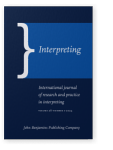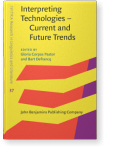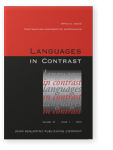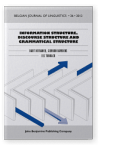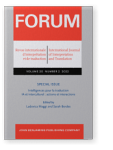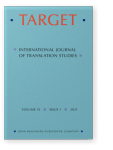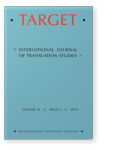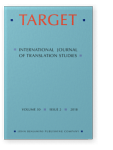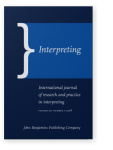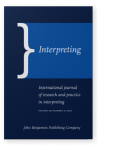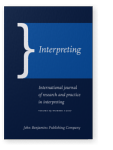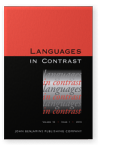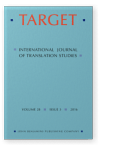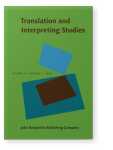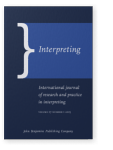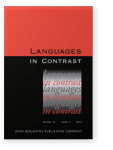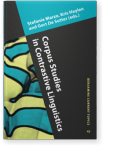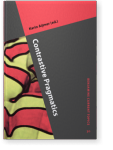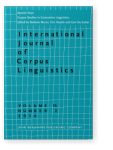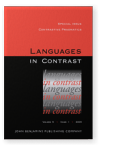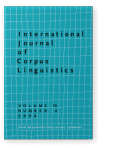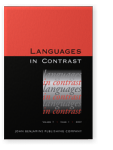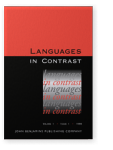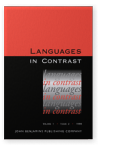Bart Defrancq
List of John Benjamins publications for which Bart Defrancq plays a role.
Journal
Titles
Interpreting Technologies – Current and Future Trends
Edited by Gloria Corpas Pastor and Bart Defrancq
[IVITRA Research in Linguistics and Literature, 37] 2023. vii, 323 pp.
Subjects Interpreting | Translation Studies
Contrasting contrastive approaches
Guest-edited by Bart Defrancq
Special issue of Languages in Contrast 15:1 (2015) v, 160 pp.
Subjects Comparative linguistics | Theoretical linguistics
Information Structure, Discourse Structure and Grammatical Structure
Edited by Bart Defrancq, Gudrun Rawoens and Els Tobback
[Belgian Journal of Linguistics, 26] 2012. v, 159 pp.
Subjects Theoretical linguistics
2023 Chapter 12. Technology in interpreter education and training: A structured set of proposals Interpreting Technologies – Current and Future Trends, Corpas Pastor, Gloria and Bart Defrancq (eds.), pp. 302–319 | Chapter
Technology is coming to interpreting but are we preparing students and professionals well enough to the technological turn? This chapter argues in favour of a structured academic approach to the integration of interpreting technology in education and training. The approach is based on a… read more
2023 Introduction Interpreting Technologies – Current and Future Trends, Corpas Pastor, Gloria and Bart Defrancq (eds.), pp. 1–5 | Chapter
2022 CIUTI conferences as fora preparing for revolutions in T&I Intelligences pour la traduction. IA et interculturel : actions et interactions., Maggi, Ludovica and Sarah Bordes (eds.), pp. 185–187 | Miscellaneous
2021 Automatic speech recognition in the booth: Assessment of system performance, interpreters’ performances and interactions in the context of numbers Target 33:1, pp. 73–102 | Article
Automatic Speech Recognition (ASR) has been proposed as a means to enhance state-of-the-art computer-assisted interpreting (CAI) tools and to allow machine-learning techniques to enter the workflow of professional interpreters. In this article, we test the usefulness of real-time transcription… read more
2019 Self-repair as a norm-related strategy in simultaneous interpreting and its implications for gendered approaches to interpreting Target 31:3, pp. 352–377 | Article
This paper analyses a possible gendered manifestation of norms in interpreting. It focuses on the use of self-repair, a textual expression of the norm, by male and female interpreters. Two research questions are examined: (1) whether the extent to which self-repairs occur in interpreting is… read more
2018 Interpreter-mediated drafting of written records in police interviews: A case study Target 30:2, pp. 212–239 | Article
Text drafting is an essential component of many of the contexts in which interpreters are called in to ensure communication (Määttä 2015). As Komter (2006) shows, the drafting process itself can be considered a turn in the interaction. Interpreters involved in such contexts thus perform a… read more
2018 The cognitive load of interpreters in the European Parliament: A corpus-based study of predictors for the disfluency uh(m) Interpreting 20:1, pp. 1–32 | Article
Cognitive load is a major source of processing difficulties in both interpreting and monolingual speech. This article focuses on measurement of cognitive load by examining the occurrence rate of the disfluency uh(m) in two corpora of naturalistic language: the EPICG, with specific reference to… read more
2017 Interpreter-mediated “paternalistic” interaction in a judge-centered courtroom: A case study from a Belgian Correctional Court Interpreting 19:2, pp. 209–231 | Article
This paper investigates an interpreter’s handling of a distinctive ‘paternalistic’ (following Tates et al. 2002) participation framework in a Belgian criminal court, whereby the defendant is the topic – but not the addressee – of the interaction. The hearing analysed, which was recorded and… read more
2017 Hedges in conference interpreting: The role of gender Interpreting 19:1, pp. 21–46 | Article
This paper, part of a project on gender differences in simultaneous interpreting, analyzes possible gender-related trends in the use of hedges by professional interpreters and examines two hypotheses: (1) simultaneous interpretations, because of processing constraints, contain fewer hedges than… read more
2016 Review of Suomela-Härmä, Härmä & Havu (2013): Représentations des formes d’adresse dans les langues romanes – Representaciones de las formas de tratamiento en las lenguas románicas – Rappresentazioni di forme allocutive nelle lingue romanze. Mémoires de la Société Néophilologique de Helsinki Languages in Contrast 16:1, pp. 164–166 | Review
2016 Assessing morphologically motivated transfer in parallel corpora Target 28:3, pp. 372–398 | Article
This paper proposes a new way of identifying and analysing positive transfer on the basis of corpus data. Taking stock of process-oriented research into what is called ‘literal translation’, transfer is defined as an instance in which a translator is primed into using a target language item that… read more
2016 The effect of informational load on disfluencies in interpreting: A corpus-based regression analysis Translation and Interpreting Studies 11:2, pp. 202–224 | Article
This article attempts to measure the cognitive or informational load in interpreting by modelling the occurrence rate of the speech disfluency uh(m). In a corpus of 107 interpreted and 240 non-interpreted texts, informational load is operationalized in terms of four measures: delivery rate, lexical… read more
2015 Contrasting contrastive approaches Contrasting contrastive approaches, Defrancq, Bart (ed.), pp. 1–3 | Article
2015 Corpus-based research into the presumed effects of short EVS Interpreting 17:1, pp. 26–45 | Article
The aim of this study, based on 32 French speeches simultaneously interpreted into Dutch at plenary sessions of the European Parliament in late 2008, was to ascertain whether short ear-voice span (EVS) affects the quality of the interpretation as is commonly stated in the literature. The speeches… read more
2012 Contingency hedges in Dutch, French and English: A corpus-based contrastive analysis of the language-internal and -external properties of English depend, French dépendre and Dutch afhangen, liggen and zien Corpus Studies in Contrastive Linguistics, Marzo, Stefania, Kris Heylen and Gert de Sutter (eds.), pp. 33–62 | Article
This article reports on a detailed corpus-based and contrastive analysis of the syntactic, semantic and functional properties of English depend, French dépendre and Dutch afhangen, liggen and zien as markers of intersubjectivity. Based on three large-scale monolingual corpora of spoken English,… read more
2012 Introduction Information Structure, Discourse Structure and Grammatical Structure, Defrancq, Bart, Gudrun Rawoens and Els Tobback (eds.), pp. 1–5 | Article
2011 Intersubjective positioning in French and English: A contrastive analysis of ‘ça dépend’ and ‘it depends’ Contrastive Pragmatics, Aijmer, Karin (ed.), pp. 37–72 | Article
Similar to the uses of default discourse markers such as ‘well’, ‘you know’ and ‘I mean’, instances of ‘it depends’ and ‘ça dépend’ can be attested in which the speaker’s intersubjective positioning seems to be the main motivation behind their use (Moissinac and Bamberg 2004). In this paper we… read more
2010 Contingency hedges in Dutch, French and English: A corpus-based contrastive analysis of the language-internal and -external properties of English depend, French dépendre and Dutch afhangen, liggen and zien Corpus Studies in Contrastive Linguistics, Marzo, Stefania, Kris Heylen and Gert de Sutter (eds.), pp. 183–213 | Article
This article reports on a detailed corpus-based and contrastive analysis of the syntactic, semantic and functional properties of English depend, French dépendre and Dutch afhangen, liggen and zien as markers of intersubjectivity. Based on three large-scale monolingual corpora of spoken English,… read more
2009 Intersubjective positioning in French and English: A contrastive analysis of ‘ça dépend’ and ‘it depends’ Contrastive Pragmatics, Aijmer, Karin (ed.), pp. 37–72 | Article
Similar to the uses of default discourse markers such as ‘well’, ‘you know’ and ‘I mean’, instances of ‘it depends’ and ‘ça dépend’ can be attested in which the speaker’s intersubjective positioning seems to be the main motivation behind their use (Moissinac and Bamberg 2004). In this paper we… read more
2008 Establishing cross-linguistic semantic relatedness through monolingual corpora: Verbs governing embedded interrogatives International Journal of Corpus Linguistics 13:4, pp. 465–490 | Article
Each instance of language comparison requires observations on semantic equivalence. Meaning is by far the most popular tertium comparationis in contrastive and typological research. However, the question of how semantic equivalence is to be determined remains extremely difficult to solve. This… read more
1998 Review of Fuchs & Robert (1997): Diversité des langues et représentations cognitives Languages in Contrast 1:1, pp. 119–121 | Review
1998 Introduction Languages in Contrast 1:2, pp. v–xi | Miscellaneous
Fundamental frequency as an acoustic mirror of interpreters’ cognitive states Interpreting: Online-First Articles | Article
The present study proposes the acoustic parameter of fundamental frequency (F0) as an alternative method for gauging interpreters’ cognitive load and fatigue during simultaneous interpreting (SI). The data collected from an English-Chinese SI experiment reported in Shao and Chai (2021) were… read more
